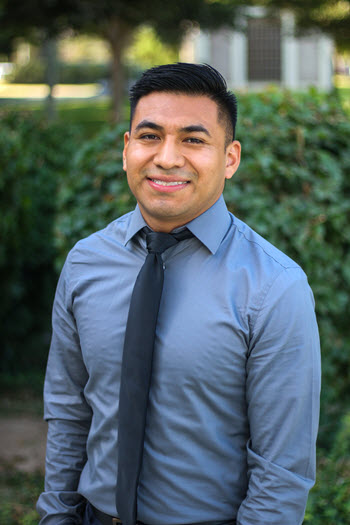
A counselor at Santa Maria High School saw potential in Fernando Martinez and encouraged him to pursue a college degree.
He told her he wasn’t sure he could leave his parents, and she asked, “what do you want to be?”
“I always wanted to be a cop, because I had friends who became gang members and eventually took the wrong path,” Martinez said. “I would like to work with youth who are on juvenile probation or in the area. Eventually, I want to have an impact on those students.”
The counselor suggested Stanislaus State and before he knew it, Martinez was accepted.
“I told my parents, ‘I'm going to go to college.’ They were tearing up and I was tearing up,” Martinez said.
His parents drove him to Turlock on a Sunday, their only day off from work, so that Martinez might begin his freshman year.
“I was super homesick, but my parents would have been a little disappointed if I had gone back,” Martinez said. “They were so happy to see me pursue higher education and change the culture and norms in my family, that education could be possible in my family.”
His parents, beside whom Martinez worked in the strawberry fields in Santa Maria from the time he was 13 through the summer following his first year of college, understood the value of an education, but they’re a little more confounded by the fact their son, the eighth of their 10 children, won’t be moving on to a career when he graduates in May.
Martinez is a McNair Scholar, who wants to pursue a master’s degree in psychology.
The McNair Scholars Program provides financial and other support for first-generation and underserved college students to apply for and be accepted to graduate school.
Martinez has had to explain to his parents, Enrique and Maria, that in his area of study, a bachelor’s degree alone won’t set him on his intended path.
For that matter, neither did a major in criminal justice, which is why he switched to psychology.
“I wanted to work with juveniles who are on probation, or at-risk youth,” Martinez said. “If I received a degree in criminal justice, it doesn’t really provide me with the counseling aspect. It does provide a lot of law enforcement knowledge, but it doesn’t provide me with counseling.”
He’d like to return to Santa Maria to work with youth who are in the same shoes he once wore, to show them the path to success. They don’t have to go from high school to the fields. There are options, and Martinez wants to direct them toward the resources that can make those possibilities reality.
It’s something he’s already done.
His younger brother is attending Fresno State and his younger sister is hoping to become a veterinarian and is attending Alan Hancock College in Santa Maria.
“I tell them to give it their best effort, that if l I could do it, they can too,” Martinez said. “There are resources to help them.”
Martinez is looking into master’s programs, all of them in California. He arrived here with his parents and siblings when he was 10 from Mexico, and wants to remain in his adopted home state. He’d ultimately like to earn a Ph.D., but it’s more important to him that he accomplish the master’s degree and start working.
“My parents are in their 60s and they’re still working six days a week in the fields,” Martinez said. “It hurts me to see them working so hard, but soon enough, I’ll be able to help support them.”